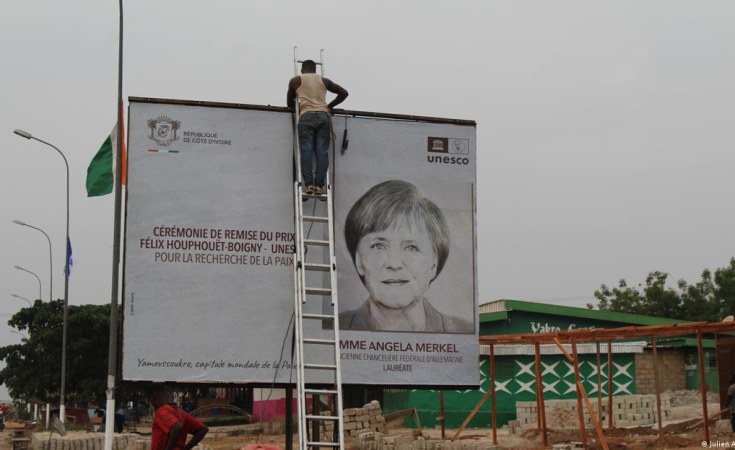For her 'open door' refugee policy in 2015, the former German chancellor was awarded the Felix Houphouet-Boigny UNESCO Peace Prize in Ivory Coast's capital Yamoussoukro.
A bright, monumental building rises 30 meters into the sky of Yamoussoukro, the strangely quiet capital of Ivory Coast, far from the hustle and bustle of the economic metropolis of Abidjan.
A white dove symbolizing peace adorns the globe in the geometrically laid out park in front of the main entrance. The institution's name is almost as impressive as the architecture: Felix-Houphouet-Boigny Foundation for Peace Research.
A 20-meter-long fabric printed with the portrait of former German Chancellor Angela Merkeldecorates the side of the building. It is an exceptional setting for Merkel's return to Africa, just over a year after she left office as chancellor.
On Wednesday, Angela Merkel received the Felix Houphouet-Boigny UNESCO Peace Prize in the self-proclaimed "world capital of peace."
Merkel calls for more opportunities in Africa
"Nobody leaves their country without a good reason to do so," Merkel said in her acceptance speech. "We all need to work to open up opportunities for people in their home countries," she emphasized, adding that the world must address the root causes of migration.
"This means working together very closely."
Ivory Coast has been part of Germany's Compact with Africa since 2017. Merkel noted that Berlin and Yamoussoukro have met regularly. "We are working for education and, of course, for sustainable energy," the 68-year-old former German leader said.
"We only hate one thing: War. We only value one thing: Peace."
'A great woman'
For this event, giant posters of Angela Merkel were everywhere in Yamoussoukro, and the former chancellor was the talk of the town. "She deserves it [the Peace Prize] because she is a great woman. She has done many actions for peace," one resident told DW.
"She is a really admirable woman. We would like to become like her," another resident said.
Many on the streets of Yamoussoukro who spoke to DW said they admire Merkel: "She was a real leader. She has accomplished a lot. She also helped migrants come to Europe and opened the door for several thousand," one resident said.
The Felix Houphouet-Boigny Peace Prize jury, named after the former president of Ivory Coast, was impressed by Merkel's courage in 2015 to open the country to refugees and welcome them.
Merkel's rallying call
At the time, Chancellor Merkel's defining phrase, "Wir schaffen das!" ("We can do this!") drew both acclaim and criticism. But Merkel sent a positive signal on refugee policy.
"The entire jury was touched by her courageous decision in 2015 to take in more than 1.2 million refugees, especially from Syria, Iraq, Afghanistan and Eritrea," jury president and 2018 Nobel Peace Prize laureate Denis Mukwege said.
According to Mukwege, the former Chancellor had left a valuable historical lesson.
UNESCO Director-General Audrey Azoulay equally praised Merkel's efforts. "Building peace also consists of opening doors to those who suffer," she said. "The jury's decision is a reminder that the way we deal with migrants and refugees is a key concern."
Courage and commitment rewarded
Jean-Noel Loucou, the foundation's secretary general, sees great merit in Merkel's commitment. He told DW that there had been a refugee crisis in Europe "with a massive influx of refugees from war-torn countries like Syria, Iraq and Afghanistan. And thanks to the actions and courage of Chancellor Angela Merkel, her country has taken in more than 1.2 million refugees."
This act, he said, would be recognized by this Felix Houphouet Boigny 2022 Prize. The prize carries $150,000 (€140,000) in prize money, a gold medal, and a certificate signed by UNESCO's director general, Loucou added.
Merkel said she will donate the prize money to an Ivorian NGO called "L'enfance en danger."
The Felix Houphouet-Boigny Foundation is celebrating its 50th anniversary 30 years after the death of Ivory Coast's first president. Several African heads of state and the chairman of the African Union (AU), Senegalese President Macky Sall, attended Wednesday's award ceremony.
Since 1991, the prize is an annual UNESCO award to institutions or individuals who have made outstanding contributions to human rights and peace worldwide. The prize was established in 1989 and named after Ivorian President Houphouet-Boigny. In 1991, Nelson Mandela and Frederik Willem de Klerk were honored for their efforts to end apartheid in South Africa.
The list of honorees over the decades is long: For example, in 1994, the prize went to King Juan Carlos I of Spain and former US President Jimmy Carter. In 2005, Abdoulaye Wade, then president of Senegal, and in 2013, Francois Hollande, former president of France, received the award for peace.
Julien Adaye contributed to this article originally written in German


